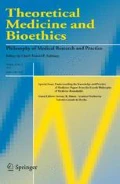Abstract
Professional autonomy interferes at a structural level with the variousaspects of the health care system. The health care systems that can bedistinguished all feature a specific design of professional autonomy,but experience their own governance problems. Empirical health caresystems in the West are a nationally coloured blend of ideal type healthcare systems. From a normative perspective, the optimal health caresystem should consist of elements of all the ideal types. A workableoptimum taking national values into account could be attained bygovernance structures that also introduce elements from other ideal typesystems. Thus a normative approach to medical practice guaranteeing anessential degree of professional autonomy for a relationship of trustbetween the patient and the physician, could be combined with anefficient and equitable allocation of health care resources.
Similar content being viewed by others
REFERENCES
Brody H, Miller FG. The internal morality of medicine: Explication and application to managed care. Journal of Medicine and Philosophy 1998; 23(4): 384–410.
Emanuel EJ, Brett AS. Managed competition and the patient-physician relationship. New England Journal of Medicine 1993; 329: 879–882.
Enthoven AC. Theory and Practice of Managed Competition in Health Care Finance. Amsterdam: North-Holland, 1988.
Gregory PR, Stuart RC. Comparative Economic Systems. Boston: Houghton Mifflin Company, 1995.
Have HA ten. Medical technology assessment and ethics-Ambivalent relations. Hastings Center Report 1995; 25(5): 3–9.
Heitman E. Ethical issues in technology assessment. International Journal of Technology Assessment in Health Care 1998; 14(3): 544–566.
Hoogland J, Jochemsen H. Professional autonomy and the normative structure of medical practice. This volume, pp. 457–475.
Horner JS. Autonomy in the medical profession in the United Kingdom-an historical perspective. This volume, pp. 409–423.
Jakubowski E, Busse R. Health Care Systems in the EU-a Comparative Study. Luxembourg: European Parliament, 1998.
Nys H, Schotsmans P. Professional autonomy in Belgium. This volume, pp. 425–439.
Polder JJ, Hoogland J, Jochemsen H, Strijbos S. Profession, practice and profits: Competition in the core of health care system. Systems Research and Behavioral Science 1997; 14(6): 409–421.
Sacchini D, Antico L. The professional autonomy of the medical doctor in Italy. This volume, pp. 441–456.
Williamson OE. The Economic Institutions of Capitalism. New York: The Free Press, 1985.
Author information
Authors and Affiliations
Rights and permissions
About this article
Cite this article
Polder, J.J., Jochemsen, H. Professional Autonomy in the Health Care System. Theor Med Bioeth 21, 477–491 (2000). https://doi.org/10.1023/A:1009977407106
Issue Date:
DOI: https://doi.org/10.1023/A:1009977407106




